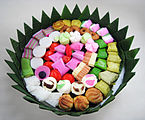Kue lapis
 Three slices of kue lapis in different colors | |
| Alternative names | Kue Pepe[1] Kuih Lapis (Malaysia, Singapore, and Brunei) |
|---|---|
| Type | Kue |
| Course | Dessert |
| Place of origin | Indonesia[2][3] |
| Region or state | Nationwide |
| Associated cuisine | Indonesia, Malaysia, Singapore, and Brunei |
| Serving temperature | Room temperature |
| Main ingredients | Rice flour, sugar, coconut milk |
Kue lapis is an Indonesian kue, or a traditional snack of steamed colourful layered soft rice flour pudding.[4] In Indonesian, lapis means "layers". This steamed layered sticky rice cake or pudding is quite popular in Indonesia[5] and Suriname (where it is simply known as lapis) and can also be found in the Netherlands through their colonial links.[6]
Kue lapis is also very popular in neighbouring Malaysia, Singapore, and Brunei, where it is called kuih lapis. Kue lapis was introduced by the Sino-Burmese to Lower Myanmar, where it is known as kway lapay (ကွေလာပေး) or kway lapaysa (ကွေလာပေးစ).[7]
Ingredients and cooking method
[edit]
This snack usually consists of two alternating coloured layers, thus the name of the cake.[5] The cake is made of rice flour, sago, coconut milk, sugar, salt, and food colouring.[5] Popular food colouring includes green-coloured pandan and red frozen food colouring. It is common to find rainbow layered kue too. This cake is steamed gradually, and layers are subsequently added in alternating order to avoid different colours mixing together. This method will create layered pudding-cake. Kue Lapis has a bouncy gelatin-like texture, yet, unlike jelly, this cake is quite sticky and chewy due to the rice pudding content.[4]
Kue lapis is similar to lapis legit or spekkoek, the difference being that lapis legit is a puffy layered cake, made of flour and is baked, while kue lapis is a moist layered pudding, made of rice flour and sago, and is steamed.[8]
See also
[edit]- Lapis legit
- Sapin-sapin, a similar Filipino dessert
- Khanom chan, a similar Thai kue dessert
- Bánh da lợn, a similar Vietnamese dessert
- List of steamed foods
References
[edit]- ^ "Kue Pepe, Si Manis Berlapis dari Betawi". Detik. 22 June 2012. Retrieved 2020-10-18.
- ^ "Menikmati Jajanan Tradisional Kue Lapis Pelangi, Rasanya". Inews. 12 October 2018. Retrieved 2020-10-18.
- ^ "Mengenal Geplak, Lapis Legit, dan Kue-Kue Khas Betawi Lainnya". Tirto. 23 October 2019. Retrieved 2020-10-18.
- ^ a b "Kue Lapis (Steamed Layer Cake)". www.indonesiancooking101.com. 30 June 2019. Archived from the original on November 22, 2021. Retrieved 2020-07-27.
- ^ a b c George, M. L. C. (2009). Coconut Recipes from Around the World. Bioversity International. p. 26. ISBN 978-92-9043-806-9.
Indonesia: Layered Sticky Rice Cake (Kue Lapis Tepung Beras)
- ^ "Kue lapis, steamed layered cake". What to cook today?. Retrieved 11 June 2015.
- ^ ဘိုဘို (2019-02-06). "ခေါက်ဆွဲစားတဲ့ မြန်မာများ". BBC News မြန်မာ (in Burmese). Retrieved 2021-01-14.
- ^ "Bedanya Kue Lapis dan Lapis Legit – Golali.id" (in Indonesian). Retrieved 2024-08-04.

